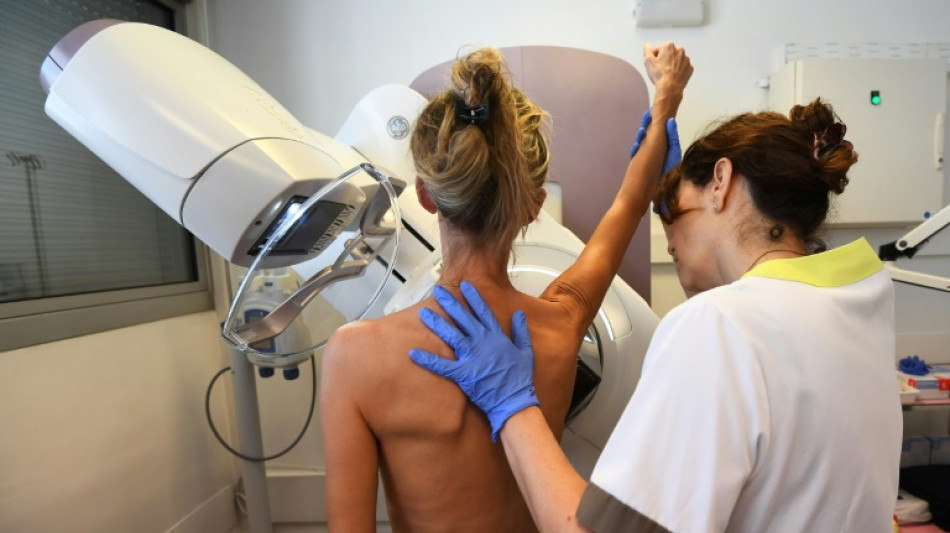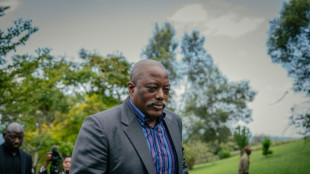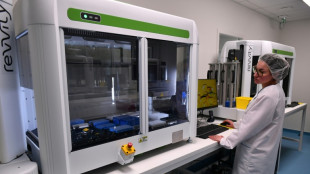
-
 Rugby World Cup draw set for December 3
Rugby World Cup draw set for December 3
-
Strong quake in central Philippines kills 19 as search ongoing

-
 Chelsea memories don't 'feed' Mourinho after return ends in defeat
Chelsea memories don't 'feed' Mourinho after return ends in defeat
-
OpenAI launches Sora 2 with TikTok-style app

-
 Nike shares rally on progress in turnaround
Nike shares rally on progress in turnaround
-
Liverpool lose to Galatasaray in Champions League, Chelsea beat Mourinho's Benfica

-
 Stars align for Louis Vuitton, Stella McCartney at Paris Fashion Week
Stars align for Louis Vuitton, Stella McCartney at Paris Fashion Week
-
Tigers down Guardians, Cubs edge Padres in baseball playoffs

-
 Mourinho's Benfica beaten on Chelsea return in Champions League
Mourinho's Benfica beaten on Chelsea return in Champions League
-
Beaches shut on Spain's Ibiza as downpours spark floods

-
 Liverpool slump to Champions League defeat at Galatasaray
Liverpool slump to Champions League defeat at Galatasaray
-
Spurs snatch late draw at Bodo/Glimt in Champions League

-
 Mourinho's Benfica beaten on Chelsea return
Mourinho's Benfica beaten on Chelsea return
-
Dow ends at record as US stocks shrug off shutdown risk

-
 UN Security Council OKs new military force to fight Haiti 'terrorist' gangs
UN Security Council OKs new military force to fight Haiti 'terrorist' gangs
-
Dominant Inter sweep past Slavia Prague in Champions League

-
 Bad Bunny Super Bowl show has MAGA hopping mad
Bad Bunny Super Bowl show has MAGA hopping mad
-
Amazon adds AI muscle to connected home lineup

-
 Antarctic sea ice hits its third-lowest winter peak on record
Antarctic sea ice hits its third-lowest winter peak on record
-
UN Security Council approves new military force to fight Haiti gangs

-
 Dolphins' Hill out for season after knee surgery
Dolphins' Hill out for season after knee surgery
-
Rodri 'not ready' for rigours of Man City schedule, says Guardiola

-
 With all-or-nothing Gaza plan, Trump turns tables for Israel
With all-or-nothing Gaza plan, Trump turns tables for Israel
-
Trump announces Pfizer deal he says will lower certain drug prices

-
 Trump gives Hamas '3 or 4 days' on Gaza deal
Trump gives Hamas '3 or 4 days' on Gaza deal
-
Real Madrid thrash Kairat with Mbappe hat-trick

-
 Deepti, Amanjot fire as India crush Sri Lanka in Women’s World Cup opener
Deepti, Amanjot fire as India crush Sri Lanka in Women’s World Cup opener
-
Deadlines loom for Milan's Olympic village as Winter Games near

-
 At least 5 dead after strong quake in central Philippines
At least 5 dead after strong quake in central Philippines
-
Estonia PM says Russia incursions aim to distract EU from Ukraine: AFP interview

-
 DR Congo ex-president Kabila sentenced to death in absentia for 'treason'
DR Congo ex-president Kabila sentenced to death in absentia for 'treason'
-
Trump says US government will 'probably' shut down

-
 Board of Spain's Sabadell bank rejects improved BBVA takeover bid
Board of Spain's Sabadell bank rejects improved BBVA takeover bid
-
Howe blasts irrelevant criticism of Woltemade after 'idiot' jibe

-
 Erasmus ready for 'high stakes' Argentina clash in Rugby Championship finale
Erasmus ready for 'high stakes' Argentina clash in Rugby Championship finale
-
Starmer vows to fight for Britain's 'soul', thwart far right

-
 Strong quake causes damage, panic in central Philippine island
Strong quake causes damage, panic in central Philippine island
-
PSG must keep Barca's 'Harry Potter' Pedri at bay: Luis Enrique

-
 'I couldn't reach them': Afghans abroad despair at blackout
'I couldn't reach them': Afghans abroad despair at blackout
-
US stocks slip as government shutdown looms

-
 Key warns England not to be 'stupid' on Ashes tour
Key warns England not to be 'stupid' on Ashes tour
-
UN calls for Taliban to restore internet as Afghanistan goes dark

-
 Saliba says he was focused on staying at Arsenal after signing new deal
Saliba says he was focused on staying at Arsenal after signing new deal
-
Starmer vows to fight for 'decent' Britain, as he battles Farage

-
 US on brink of government shutdown with funding talks stalled
US on brink of government shutdown with funding talks stalled
-
Human skin cells turned into fertilisable eggs for first time

-
 UN warns Myanmar conflict blocking Rohingya return
UN warns Myanmar conflict blocking Rohingya return
-
Trump tells generals US faces 'war from within'

-
 Williams absence 'could help us', say Dortmund as Guirassy back against Athletic
Williams absence 'could help us', say Dortmund as Guirassy back against Athletic
-
Louis Vuitton unveils ethereal collection at Paris Fashion week


New hope for patients with less common breast cancer
A new treatment nearly halves the risk of disease progression or death from a less common form of breast cancer that hasn't seen major drug advances in over a decade, researchers reported Monday.
Results from the study, presented at the annual meeting of the American Society for Clinical Oncology, are expected to be submitted to regulators and could soon establish a new first-line therapy for people with HER2-positive metastatic breast cancer -- the advanced stage of a form that comprises 15–20 percent of all breast cancer cases.
HER2-positive cancers are fueled by an overactive HER2 gene, which makes too much of a protein called human epidermal growth factor receptor 2 that helps cancer cells grow and spread.
Patients with HER2-positive breast cancer that has spread to other parts of the body live around five years.
"Seeing such a striking improvement was really impressive to us -- we were taking a standard and almost doubling how long patients could have their cancer controlled for," oncologist Sara Tolaney, chief of the breast oncology division at Dana-Farber Cancer Institute, told AFP.
The current standard of care, known as THP, combines chemotherapy with two antibodies that block growth signals from the HER2 protein. The new approach uses a drug called trastuzumab deruxtecan (T-DXd), an antibody attached to a chemotherapy drug.
- 'Smart bomb' -
This "smart bomb" strategy allows the drug to target cancer cells directly. "You can bind to the cancer cell and dump all that chemo right into the cancer cells," explained Tolaney.
"Some people call them smart bombs because they're delivering chemo in a targeted fashion -- which is how I think we're able to really increase efficacy so much."
Common side effects included nausea, diarrhea and a low white blood cell count, with a less common effect involving lung scarring.
T-DXd is already approved as a "second-line" option -- used when first-line treatments stop working. But in the new trial, it was given earlier, paired with another antibody, pertuzumab.
In a global trial led by Tolaney, just under 400 patients were randomly assigned to receive T-DXd in combination with pertuzumab, thought to enhance its effects.
A similar number received the standard THP regimen. A third group, who received T-DXd without pertuzumab, was also enrolled -- but those results haven't yet been reported.
- 44 percent risk reduction -
At a follow-up of 2.5 years, the T-DXd and pertuzumab combination reduced the risk of disease progression or death by 44 percent compared to standard care.
Fifteen percent of patients in the T-DXd group saw their cancer disappear entirely, compared to 8.5 percent in the THP group.
Because this was an interim analysis, the median progression-free survival -- meaning the point at which half the patients had seen their cancer return or worsen -- was 40.7 months with the new treatment, compared to 26.9 months with the standard, and could rise further as more data come in.
Tolaney said the results would be submitted to regulators around the world, including the US Food and Drug Administration, and that future work would focus on optimizing how long patients remain on the treatment, particularly those showing complete remission.
"This represents a new first-line standard treatment option for HER2-positive metastatic breast cancer," said Dr. Rebecca Dent, a breast cancer specialist at the National Cancer Center Singapore who was not involved in the study
C.Koch--VB

